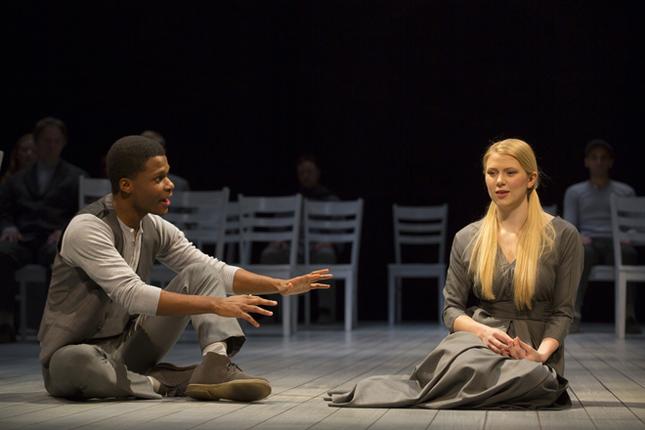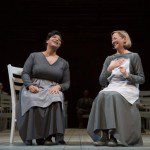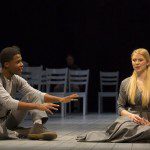‘Our Town’: 75 Years on, Still Yours and Mine
By • February 11, 2013 0 1838

“Our Town” by Thornton Wilder, now enjoying a splendid 75th anniversary production at the Ford’s Theatre, is a paradox, a contradiction—in its aspirations and results, in the feelings it engenders and the way it has always and continues to be regarded. The play garners large amounts of affection with an almost equal amount of disdain and criticism.
Count this writer and critic in the affectionate corner, in regards to “Our Town,” and more generally, the works of Wilder as both playwright and novelist. This is not the place to talk about “The Bridge at San Luis Rey,” “The Eighth Day” or even Wilder’s career. We’re concerned with this production of “Our Town.” At this time and without hesitation, I would urge anyone with a mind or half a mind to go see it, experience it. I would urge children—accompanied by adults, if not critics—and young people and old people however slow of foot, and the residents of this city as well as visitors to see it, or the transient, if not transcendental stewards of our government to go see it.
The paradox—for directors and less so actors, not to mention the audience—of “Our Town” is that its three acts are rooted in invigorating, palatable specifics of time and place, yet are presented almost as abstractions—bare stage, uniform costumes, minimal props as when the play first saw the light of stage many decades ago. In addition, the characters behave and talk and come armed with memories and knowledge only of where and who they are living in a small American town and place—Grover’s Landing, N.H., in the early years of 20th century America. From the get-go, the play strives for the poetic universal, for the idea that its contents have wings and are ticketed to travel through time and universe. It means to echo and mirror whatever place, time and space it exists in a particular performance.
So, here we are in Washington in the year 2013, 75 years ago the play’s first production, a little more than 100 years past the setting of the action of the play when it opens. Some of us have heard these words spoken before. These characters and citizens of Grover’s Landing have lived for us before on some other stage, or on television back in the 1950s or more recently. The words are pretty much the same, and the characters are the same–but then again, they’re not. How things are said will be different, and how the people look will be different, and so on. Somewhere in there, something in what’s said, or a movement, or a voice, will strike someone differenty, maybe irritate them or pain them sadly. Important, too, is the fact that we are different.
Wilder shows us three things: a typical day in Grover’s Corner, the courtship and marriage of George Gibbs and Emily Webb, the son and daughter of the town’s chief doctor and editor of its newspaper, respectively, and then the dark third act where death and the meaning of the whole damn thing rears its clear-eyed head. He means to make us face our own lives, or more generously and broadly, have empathy for our humanity and its devastating limits. It is neither fully nor specifically a sentimental play for which it is often mistaken. In some ways, it is a remarkably cruel play–not because it is merciless, but because it is true. There is no question that the play has been played with sentiment and jerked for its tears the world over in all the languages known to man–and most publicly, for being the source of inspiration for the Sammy Cahn song “Love and Marriage.” Yet there is little if any sentiment here. This production, under the direction of Stephen Rayne, moves unavoidably and bravely to its conclusions.
The portrait of Grover’s Corner, it seems to me, is accurate about small town tastes, sentiment and rhythms, a town in Teddy Roosevelt’s time, where you might spot a car or two, where the constable and milkman made their rounds, where Dr. Gibbs comes home from delivering babies and where the poor Polish citizens might live. There are secrets in this town, but they’re of the kind known to and gossiped by everyone, especially the state of the clinically depressed church organist. We meet the Webb and the Gibbs family, see their children, Emily and George as teens and then boy and girl, who begin to get an inkling that they might love each other.
I think everyone here comports themselves as who they act to be—the anxious Mrs. Gibbs who wants to see Paris desperately, Dr. Gibbs who has adopted an avuncular tone of wisdom which seems to be expected of him, the resonating authority displayed by Editor Webb and the exasperation often displayed by his wife in dealing with gardens and children. The touchstones of the family seem so real that you might think, if you ever went to New England, you would find their names on tombstones in a town that doesn’t exist.
There is always a person called the stage manager to lead us through his—I would bet he’s been played in Moscow, or in Warsaw, or small town high school productions. I have seen Robert Prosky play him to fatherly ends at Arena Stage , I have seen Frank Sinatra—yes, the Sinatra—in a television production where Paul Newman was George and Eva Marie Saint was Emily. I have seen Newman play the part on television. The stage manager—has been played every which way, including by a woman, the fine actress Pat Carroll who herself once played not just Mother Courage but Falstaff. And now we see the African American actress Portia play the part, in a way that I think suited the place and the time and gave the play immediacy and accessibility.
Portia’s stage manager is of the sort that is inviting. No nonsense, she is friendly, as if to suggest that this is important to the audience, but also a proceeding in which their presence is welcome, critical. She seems more plain spoken, a little more close to the audience than others, but always keenly aware that this is a matter of import, not in a pompous, church-and-classroom sort of way, but rather as part of a echoing conversation.
She talks about one of the town’s departed, at a point already near the end of the play when you viscerally, if not actually, believe in the town and its people and the words, a young man who had fought in died in the Civil War to “protect the union even though he hadn’t seen more than 50 miles of it.” He died, she notes, looking up at the martyred president’s box, to defend the United States. Then, you remember that, to these folks, Abraham Lincoln and the bloody war were recent memories not history.
This production also brings home to me that “Our Town” is a play about theater and its place in our lives—after all, we see the stagehands, the actors and such gathering on stage, one by one or in twos, finding their place, a chair, a corner—here comes the actor—the authoritative Craig Wallace, playing Mr. Webb, and here is Emily, sitting in a chair, and here comes Fred Strother who plays the constable, and John Lescault as Joe Stoddard the local historian, and Tom Story, bringing his Simon Stimson, the organ player on stage, and so forth.
By using the barest of stages and no props—you hear a horse whinnying, or the sad or loud notes of trains charging into town—you understand better what the theater has always done right from the first traveling story teller, to the Greeks in their amphitheatre, using masks, which is to imagine ourselves and times past and now. For a writer and journalist, I suddenly noticed a pretty blond girl sit down and pick something up and appeared to be holding and scanning. It was Alyssia Gagarin, who played Emily with poignancy and keen and keening awareness, as Emily holding up and reading a newspaper which wasn’t there. It seemed to me at least a sharp, even wounding illustration of the coming fates of newspapers.
In this production, it’s worth noticing the audience—this one, a day after the production opened seemed prone to want to clap with or without prompting, and seemed to be a part of an extension of the town itself.
On the 75th anniversary of “Our Town,” this production is a showcase, not only of the gifts of the artists and actors involved, but also of the inventive spirit and imagination of Thornton Wilder, who in giving us “Our Town”, gave us our towns and the places in which we live and the life therein.
“Our Town” runs through Feb. 24 at Ford’s Theatre.
- Nickolas Vaughan as George and Alyssa Gagarin in the Ford’s Theatre production of “Our Town,” directed by Stephen Rayne. | T. Charles Erickson



